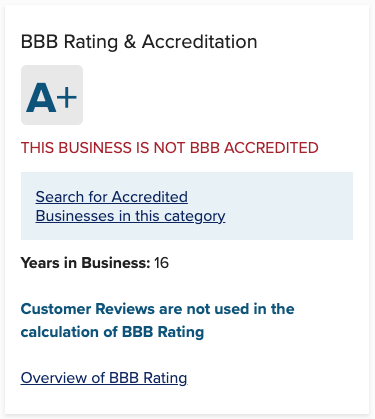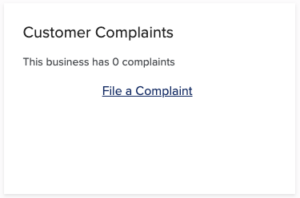The Better Business Bureau (BBB) has been around for a long time—over 110 years!
Since 1912, its business model has been to “set standards for ethical business behavior and monitor compliance.” [source: bbb.org]
In 2023, BBB continues to hold businesses to their “set standard.” Rewarding businesses that meet those standards and presumably downgrading those who don’t.
However, the business landscape for organizations focused on consumer trust has changed over the past two decades. More websites are available for consumers seeking information about a business.
Is the BBB still relevant? Is it a good source of unbiased information on a business? Well, yes and no.
Here are some things to consider if you’re looking on BBB for genuine information about a business.
Ignore the BBB rating! Here’s why:
BBB is primarily funded through annual dues paid by businesses it accredits.
In return, these businesses are granted permission to display the BBB’s accreditation and approval stamps on their storefronts and websites. 
This obviously raises concerns about a potential conflict of interest. Remember, BBB is not a governmental agency. Instead, BBB customers are the businesses themselves, rather than taxpayers or consumers.
Critics have argued that this funding arrangement creates a natural incentive for BBB to present paying clients in the best possible light while disproportionately sidelining those who don’t pay to play.
What’s more, those accreditations aren’t based on customer reviews, a metric that you presume would have significance in determining accreditation. Instead, they are calculated more on complaints received about a business.
For instance, A&R Solar has an A+ rating on BBB but we don’t have any customer reviews. Weird, huh?
This brings us to our next point.
BBB Consumer Complaints
BBB consumer complaints are the most valuable pieces of information on BBB, but also the most questionable in terms of their reliability.
By closely evaluating how companies respond to and resolve complaints, BBB weighs their action, or inaction, heavily when calculating a business’s score.
Though, even this metric doesn’t provide customers with a full picture of how well a business treats its customers.
That’s because consumers are much more likely to leave a bad review than a good one.
BBB says that when it comes to determining business grades, there are 16 factors that come into play. These factors include things like the number of BBB consumer complaints filed against the business and how the business responds to those complaints.
However, it’s important to note that a business’s grade won’t necessarily be negatively affected if a complaint doesn’t lead to a satisfactory resolution for the customer.
The only thing that really matters in terms of grading is that the business responded and made a “good faith effort to resolve complaints,” as stated by the BBB.
This means that a business could still have a good grade even if it receives numerous complaints!
As long as the business makes the effort to respond, even if that “good faith effort” is just a standard or routine response, it can maintain a high BBB rating.
With all this in mind, and with the knowledge that there are competing resources out there to help consumers make informed decisions, it’s important to remember that while the BBB does have a place in today’s consumer trust landscape, it’s always good to get a second, third, heck, fourth opinion.



